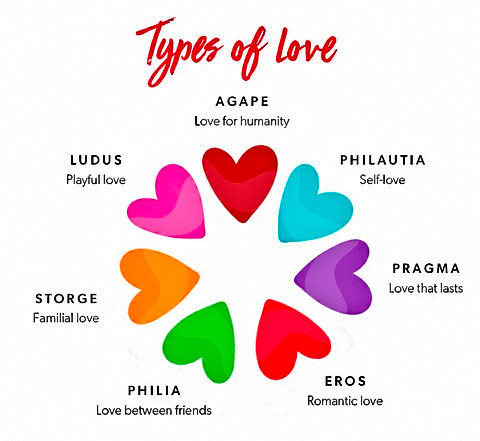The many ways to experience love
Most often when we hear the term love, romantic love immediately comes to mind, especially with Valentine’s Day coming up. Seemingly everyone focuses so much on romance, we tend to overlook that there are other types of love, too. With names derived mostly from ancient Greek, here are different types of love.
Agape or universal love. Agape is pronounced “aga-pay,” and comes from an ancient term for altruistic love. Often called the highest form of love, this is the love that can be given to everyone: strangers, nature and God. This kind of love encompasses the unselfish concern for the welfare of others.
Eros or passionate love. This is sensual, physical and emotional love, the combination of intimacy and passion toward each other, and encompasses the modern concept of romantic love. Eros was the Greek love god who shot magic arrows that caused people to fall in love. He is better known by his Roman name, Cupid.
Ludus or uncommitted love. Ludus comes from Latin rather than Greek and means game or play. This is a playful, noncommittal love that is casual and undemanding. It is focused on fun, and often involves teasing and flirting.
Philautia or self-love. This type of love refers to how people view themselves. Healthy self-love is akin to self-esteem.
Philia or friendship. This is affectionate love and involves shared goodwill. It is the kind of love that good friends feel for each other, providing mutual benefit through companionship, dependability and trust.
Pragma or practical love. This is a type of love based on duty, obligation or logic. It is the kind of love associated most often with historical arranged marriages, when physical attraction took a back seat in favor of personal qualities and compatibilities, shared goals, and one’s longer-term interests. It is still often seen in high-profile celebrity and political pairings.
Storge or familial love. Storge is pronounced “store-jay.” This type of love is the love between parents and their children. More broadly, storge is the fondness born out of familiarity and dependency on each other as a family.
This year for Valentine’s Day, whether or not you are in the midst of a romantic love, perhaps remember and acknowledge the other kinds of love too, bringing even more meaning to the day.

By Susan Helton